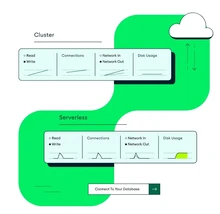When it comes to NoSQL databases, ScyllaDB and MongoDB emerge as two prominent players, each with their unique strengths and features. Both platforms aim to provide scalable, high-performance solutions for handling large volumes of data efficiently. In this comparison, we'll explore the key differences between ScyllaDB and MongoDB across various aspects.
ScyllaDB vs MongoDB: Overview
ScyllaDB and MongoDB are both NoSQL databases designed to handle large-scale, distributed data with high availability and performance.
ScyllaDB is known for its high-throughput, low-latency capabilities, making it a popular choice for applications requiring real-time data processing. Built on the Apache Cassandra framework, ScyllaDB boasts a shared-nothing architecture that enables linear scalability and fault tolerance.
MongoDB, on the other hand, is renowned for its flexibility and ease of use. It features a document-oriented data model, allowing developers to store and retrieve data in JSON-like documents. MongoDB's rich query language and dynamic schema make it suitable for a wide range of use cases, from content management to real-time analytics.
ScyllaDB vs MongoDB: Pros and Cons
- ScyllaDB and some other ScyllaDB alternatives are easier and takes less time to set up and deploy compared to MongoDB, which can be a bit more complex and time consuming.
- ScyllaDB’s visualization features and metrics tracking are basic. On the other hand, MongoDB offers robust visualization features with its Atlas Chart and built-in monitoring tools.
- ScyllaDB offers enhanced stability and redundancy capabilities, whereas MongoDB's redundancy capabilities are basic, and it requires an upgrade.
- ScyllaDB doesn't offer the same level of schema flexibility as MongoDB's document-oriented model, making it less suitable for evolving data structures.
ScyllaDB vs MongoDB: In Terms of Features
- Data Model: MongoDB uses a JSON-like document-oriented data model structure that can store various data types within a single record. On the other hand, ScyllaDB works on a wide-column store model, where data is organized in key-value pairs. This can lead to efficient read/write performance, but limits schema flexibility compared to document-oriented models like MongoDB.
- Query Language: ScyllaDB usually works with Cassandra Query Language (CQL) and enables users to perform functions such as update, delete insert, create select, and so on. On the other hand, MongoDB uses its own MQL (MongoDB Query Language). Both CQL and MQL are effective languages for querying. However, CQL is similar to SQL, and is preferred by those who are already familiar with SQL. MQL has different query syntax and a steeper learning curve compared to CQL.
- Architecture: ScyllaDB makes use of multi-primary architecture, where data is replicated across all nodes in the cluster. On the other hand, MongoDB uses a primary-secondary architecture, which simplifies data management but can lead to performance bottlenecks at large scale. Therefore, ScyllaDB has an edge over MongoDB.
- Indexing and Querying: MongoDB offers versatile querying features like secondary indexes, full-text search, and geospatial queries, alongside tools for complex data processing such as aggregation and map-reduce. In contrast, ScyllaDB focuses on efficient key-value lookups and range queries. However, it lacks extensive querying and analytical capabilities as compared to MongoDB.
MongoDB vs ScyllaDB: Scalability
ScyllaDB's shared-nothing architecture offers seamless scalability and allows users to add nodes to the cluster to accommodate growing workloads. Its shard-per-core data sharding and consistent hashing ensure appropriate data distribution and load balancing across nodes for maximum resilience.
MongoDB and other MongoDB alternatives support horizontal scalability through sharding, allowing users to distribute data across multiple nodes for improved performance. However, managing a sharded MongoDB cluster can be tricky compared to Scylla, and may require careful planning to ensure optimal performance.
MongoDB vs ScyllaDB: Performance
ScyllaDB provides strong raw throughput and latency, thanks to its highly optimized codebase and efficient storage engine. With support for millions of operations per second per node, ScyllaDB is well-suited for latency-sensitive applications requiring real-time data processing.
On the other hand, MongoDB offers various optimizations and performance tuning options, but it still somewhere lacks in achieving the level of throughput and latency that ScyllaDB offers.
ScyllaDB vs MongoDB: Community and Support
ScyllaDB offers a vibrant open-source community and extensive documentation to users with access to resources, tutorials, and community forums. Additionally, ScyllaDB provides live chat and mail support to troubleshoot any issue.
On the other hand, MongoDB offers a large and active community with comprehensive documentation and online forums for support. In addition to community resources, MongoDB provides support through live chat and mail. However, MongoDB’s customer support is a bit slow compared to Scylla’s.
Which is Better, ScyllaDB or MongoDB?
Both ScyllaDB and MongoDB offer powerful solutions for handling large-scale, distributed data with high availability and performance.
ScyllaDB's architecture is designed for scalability and fault tolerance, while MongoDB provides rich querying capabilities and a mature ecosystem.
Ultimately, the choice between ScyllaDB and MongoDB depends on your specific requirements, performance expectations, and familiarity with each platform. Whether you prioritize raw performance, ease of use, or scalability, both ScyllaDB and MongoDB offer compelling options for building modern, data-driven applications.


 5 Ratings & 0 Reviews
5 Ratings & 0 Reviews


















